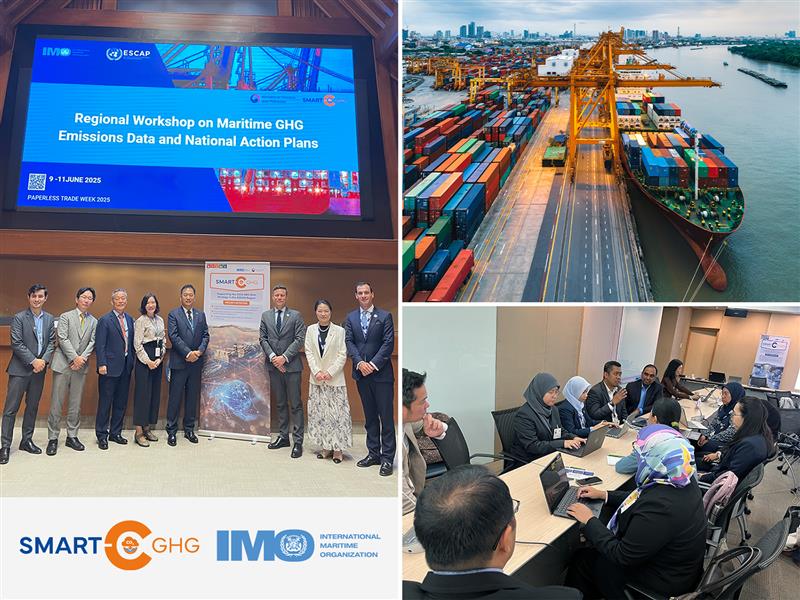Members of the ASEAN group of Southeast Asian nations are stepping up to move from ambition to action in maritime decarbonization.
To support this process, a regional workshop on Maritime GHG Emissions Data and National Action Plans (9 -11 June) took place in Bangkok, providing practical tools and guidance to overcome persistent challenges in emissions data systems in the region, national policy planning, and green financing.
The regional inception workshop was co-organized by IMO and the United Nations Economic and Social Commission for Asia and the Pacific (UN ESCAP) under the SMART-C GHG Project with funding from the Republic of Korea.
Thirty participants from ASEAN countries (Association of Southeast Asian Nations) benefited from hands-on discussions on the IMO Data Collection System, seafarer training strategies, and policy frameworks for the development of national action plans (NAPs). The workshop featured contributions from technical experts from IMO, United Nations Economic and Social Commission for Asia and the Pacific (ESCAP), the World Maritime University (WMU), the Maritime Technology Cooperation Centre in Asia (MTCC Asia), and multilateral development banks.
Mr. Weimin Ren, Director of ESCAP’s Transport Division, emphasised the urgency of maritime decarbonisation for sustainable regional development:
“At ESCAP, we view sustainable and resilient maritime connectivity as a cornerstone of regional economic cooperation and integration. This workshop plays a critical role in equipping countries with the tools and knowledge needed to reduce maritime emissions while enhancing operational reliability. Promoting low- and zero-emissions green shipping in Asia and the Pacific is not only an environmental necessity, but a strategic opportunity to future-proof maritime transport systems across the region.”
Mr. Roel Hoenders, Head of Climate Action and Clean Air at IMO, acknowledged:
“This workshop is a timely step towards turning the 2023 IMO GHG Strategy into practical national action. Robust data systems are critical for monitoring emissions and shaping effective policies, while capacity building ensures countries can adopt low- and zero-carbon technologies safely and efficiently. IMO remains committed to supporting its Member States through technical assistance and collaboration under initiatives like SMART-C, to drive an inclusive transition to greener shipping.”
Country presentations highlighted real-world progress and challenges in national policies including data system development. A case study from Singapore offered a replicable example of long-term national decarbonization strategy. A final panel explored how multilateral development banks can help unlock financing for green maritime infrastructure and capacity development in the region.
The workshop concluded with practical recommendations for national and regional follow-up, including continued peer-to-peer learning, enhanced donor coordination, and alignment of financial resources with national climate goals. These outcomes will feed directly into SMART-C's ongoing technical assistance and guide countries on their path toward a low-carbon maritime future.
Countries that participated in the event include: Brunei Darussalam, Cambodia, Indonesia, Malaysia, Philippines, Singapore, Thailand and Viet Nam.
SMART-C GHG Project
The SMART-C GHG Project is an initiative led by IMO, aimed at supporting the Governments of the Philippines and Viet Nam in formulating and implementing maritime GHG reduction policies and National Action Plans (NAPs). Other ASEAN Member States can benefit from the project’s regional activities. These efforts include capacity-building on emissions data collection and analysis, policy formulation, and the upskilling of seafarers, all in alignment with the 2023 IMO Revised GHG Strategy.
